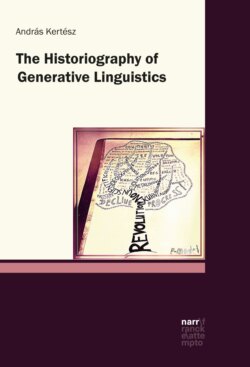Читать книгу The Historiography of Generative Linguistics - András Kertész - Страница 28
На сайте Литреса книга снята с продажи.
2.4 ›Lectures on Government and Binding‹ (ChomskyChomsky, Noam 1981) 2.4.0 Background information
ОглавлениеThe significance of Government-BindingGovernment and Binding, Theory of Theory (ChomskyChomsky, Noam 1981), later called the Theory of Principles and ParametersPrinciples and Parameters, Theory of (Chomsky & LasnikLasnik, Howard 1993), is as follows:
It seems to have provided a framework for the solution of the logicallogic problem of languagelanguage acquisition already raised in ChomskyChomsky, Noam’s SkinnerSkinner, B.F.-review and re-formulated in AspectsAspects.1 The problem is rooted in the observation that children who are learning their mother tongue experience datadata which are insufficient for the acquisition of the grammargrammar, but in spite of this they acquire the grammar of their language quite easily and in a relatively short time. How can it happen that despite this poverty of stimulus, they acquire the grammar of their language? To put it simply, the core of the argument is this:Children learn the grammargrammar of their languagelanguage in a relatively short time.The languagelanguage datadata which children experience and which serve as the input for the acquisition of grammargrammar are insufficient for acquiring the grammar.If the languagelanguage datadata which serve as the input for the acquisition of grammargrammar are not sufficient for acquiring the grammar and children learn the grammar of their language in a relatively short time, then children are born with innate grammaticalgrammatical knowledge.2Therefore, children are born with innate grammaticalgrammatical knowledge.But then, the next question is: what does this innate knowledge consist of? In the Theory of Government and Binding, instead of ›languagelanguage acquisition device‹, which was applied in AspectsAspects, the term ›language faculty‹ was introduced. The language faculty is assumed to be part of the mind and enables the child to acquire the grammargrammar of her language on the basis of linguistic experience.3 While induction does not provide an explanation for the solution of the problem, the solution proposed by the Theory of Principles and ParametersPrinciples and Parameters, Theory of (Government-BindingGovernment and Binding, Theory of Theory) says that children are born with the principles of universal grammar associated with parameters and it is these parameters that are set during the process of language acquisition on the basis of the linguistic datadata that they experience in their environment.4
It explains the syntactic properties of individual languageslanguage by setting the parameters associated with universal principles. In this way, it is able to account for both the universal regularities of the language faculty and the differences between the syntactic peculiarities of individual languages.5
The theorytheory presupposes the modularitymodular hypothesis which says that knowledge of languagelanguage consists of relatively autonomous subsystems interacting with each other. As a consequence of this hypothesis, the theory explains the structure of particular expressions by the interaction of universal principles that belong to different relatively autonomous subsystems of grammargrammar rather than by structure-specific rules.6
»Linguistics […] becomes part of psychology, ultimately biologybiology. Linguistics will be incorporated within the natural sciencesciencenaturals […]«. (ChomskyChomsky, Noam 1986: 27)
